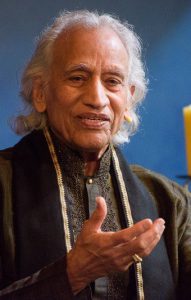 Blog Posts
Blog Posts
Guru-Disciple Relationship
Yesterday I didn’t start with this important instruction: Do not, under any circumstances, believe what you are about to read. Instead, investigate it yourself. Determine, through your own reasoning and experience, whether it’s true.
 The guru-disciple relationship is a hot button topic. People have such strong feelings about it. For some, it seems cult-like. Others have concerns about bowing to another person or seeing someone as a master or giving another person total control over their lives. These concerns exist because problems have happened in the past or these customs are outside our own culture. So, let’s talk about what this relationship is and is not.
The guru-disciple relationship is a hot button topic. People have such strong feelings about it. For some, it seems cult-like. Others have concerns about bowing to another person or seeing someone as a master or giving another person total control over their lives. These concerns exist because problems have happened in the past or these customs are outside our own culture. So, let’s talk about what this relationship is and is not.
What it is not.
Part of the confusion around guru-shishya (the guru-disciple relationship) comes from the text of the Guru Gita, a handbook on this topic. Here are some of the problem slokas:
God and Guru are but two names;
The truth is they are forever one.The Guru’s wishes thou must obey;
Think of nothing but Him all day.Thou [The Guru] art my Mother and Father too;
Thou are my Brother, Thou art my God.
Thou art my wealth in this world of change.
Salutations I offer Thee.
Is it any wonder that cults do rise up around gurus? Is it any wonder that the mere human who sits in such a place of adoration and love falls prey to their own lusts, greed and pride?
Here’s the reason the guru-shishya relationship breaks so often. Nothing written above is about the person up front. It is never about the person sitting at the front of the group, ever. Most people either don’t know that or willingly ignore it.
Everything written above is about you, the Real You. You are the True Guru but, most likely, you don’t believe it; so, we use external gurus to point us back to The Guru that we are.
What it is.
The external guru is a mirror allowing you to see your false self and True Self more clearly. The hard part is knowing whether you are seeing the false  self or True Self. How do you know which one you’re seeing? That’s a question that is better left unanswered by me; exploring it on your own will help you much more than if I just tell you the answer, for now.
self or True Self. How do you know which one you’re seeing? That’s a question that is better left unanswered by me; exploring it on your own will help you much more than if I just tell you the answer, for now.
How does it work?
First, find a guru. Yesterday I wrote a little about finding a guru. Let me add one caveat to what I wrote yesterday that comes from the Bhakti Sutra:
It is hard to obtain the grace of a great soul, because it is hard to recognize such a one; but if a man receives his grace, the effect is infallible.
Bhakti Sutra, 39
Two points from above need emphasis. Finding a guru is hard. You might think it’s because such a “great soul” is rare. Nope, it’s because they’re ordinary and you don’t know what to look for. Some are very charismatic, others you will never notice.
The second point is that the effect of receiving the grace of a guru is infallible not “the guru is infallible.” Every guru makes mistakes, they’re still human! So, what is the effect?
How does being near your guru make you? How are you when you are not near them? Do both experiences move you in the same direction, even if at different speeds? The effect is that your life will become more steady both when you are with your guru and when you are not. The effect may happen slowly or it may happen all of a sudden but, if you receive the guru’s grace, it will happen. If it doesn’t seem to be happening, ask yourself if you are practicing diligently all you’ve learned or is there something you don’t understand?
Practice. Ask questions but also look at your fellow travelers. Are they becoming more steady, are there examples among your guru’s followers of how you want to be? Are there many examples or only a few? Are they the same when the guru is near and when the guru is far away? If you don’t get a positive answer for all these questions, either you need to be more diligent or your guru isn’t all you think they are.
Stages
Just like everything else in life, guru-shishya moves through stages. Moving from stage to stage is not what is vital; rather, give yourself fully to whatever stage you find yourself practicing.
Students
 The first stage is that of a student. As a student, you may have many teachers and gurus or you may have only one. Either way, the teacher or guru usually has no idea that you even consider yourself their student. Your chosen guru has no say in whether you take them as you guru. It doesn’t even matter if they acknowledge themselves as a guru or not. That determination is entirely up to you.
The first stage is that of a student. As a student, you may have many teachers and gurus or you may have only one. Either way, the teacher or guru usually has no idea that you even consider yourself their student. Your chosen guru has no say in whether you take them as you guru. It doesn’t even matter if they acknowledge themselves as a guru or not. That determination is entirely up to you.
When I took Yogi Desai as my guru, he had many disciples already but not once did he say, “I’m your guru” or even “You can think of me as your guru.” I had been studying with him via CD and books every day for three months before I met him. The minute before he walked into the room, he was a considerate man I had briefly encountered the night before and wanted to learn from. The moment he walked into the room the next morning, I knew I had to dedicate myself to living everything I could learn from him.

Initiates & Disciples
From this point forward, I can only report on my own experiences. Initiation makes the relationship between guru and disciple formal. The guru accepts the initiate as a disciple but what does that mean? Gurudev put it this way when I received initiation:
All I ask is that you practice what you have learned.
And I will love you, even when you hate me.
What is the difference between an initiate and a disciple? Every person who receives initiation is an initiate but, from my experience, not every initiate is a disciple. An initiate focuses, more or less, on using what they have learned to better themselves. A disciple is someone who dedicates themselves to living what they have learned and sharing that with others. Only you can know if you remain an initiate or if you have become a disciple.
Beyond
In the movie, The Last Jedi, Yoda says, “We are what they grow beyond. That is the true burden of all masters.” My guru’s guru, Swami Kripalu, asked his guru, “When do you receive enlightenment?” He replied, “The guru is enlightened when his student’s student is enlightened.” The greatest gift you can give a guru is to embody what they teach even more fully than they do.
More
There is much more to this whole guru thing. What does it mean to receive the grace of a guru? What is service to the guru that’s mentioned in many texts? Not to mention the answer to that pesky question, “Which self am I seeing in that mirror?” Rather than covering those now, I’ll write about those topics next time.
Until then,
Jai Bhagwan



